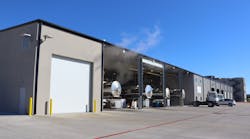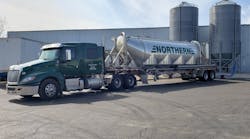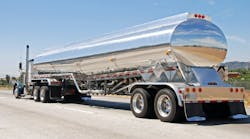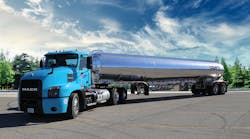US-NAFTA freight totaled $98.2 billion as all five major transportation modes carried more freight by value with North American Free Trade Agreement (NAFTA) partners Canada and Mexico in May 2017 compared to May 2016, according to the TransBorder Freight Data released by the US Department of Transportation’s Bureau of Transportation Statistics (BTS).
The 9.4% rise from May 2016 is the seventh consecutive month in which the year-over-year value in current dollars of US-NAFTA freight increased from the same month of the previous year.
The value of commodities moving by pipeline increased 60.3%, vessel by 28.4%, air by 8.7%, rail by 7.0%, and truck by 5.0%. In contrast with recent months, there was only a modest year-over-year increase in the price of mineral fuels (3.8%). In May, the increase in the value of freight by pipeline and vessel more closely reflected a greater volume of mineral fuels moved rather than an increase in the price of those commodities.
Trucks carried 63.4% of U.S.-NAFTA freight and continued to be the most heavily utilized mode for moving goods to and from both US-NAFTA partners. Trucks accounted for $32.2 billion of the $53.5 billion of imports (60.2%) and $30.1 billion of the $44.7 billion of exports (67.3%).
Rail remained the second largest mode by value, moving 15.5% of all US-NAFTA freight, followed by vessel, 6.4%; pipeline, 5.7%; and air, 3.7%. The surface transportation modes of truck, rail, and pipeline carried 84.7% of the total value of US-NAFTA freight flows.
From May 2016 to May 2017, the value of US-Canada freight flows increased by 11.4% to $51.2 billion as the value of freight on all five major modes increased from a year earlier. The value of freight carried on pipeline increased by 66.0%, vessel by 26.0%, rail by 9.8%, air by 9.7%, and truck by 5.4%. The percent change in commodities moved by pipeline and vessel reflects an increase in the volume of mineral fuels moved year-over-year and only a modest (3.8%) increase in the price of those commodities.
Trucks carried 57.8% of the value of the freight to and from Canada. Rail carried 16.4% followed by pipeline, 10.5%; air, 4.5%; and vessel, 3.8%. The surface transportation modes of truck, rail, and pipeline carried 84.7% of the value of total US-Canada freight flows.
From May 2016 to May 2017, the value of US-Mexico freight flows increased by 7.2% to $47.0 billion as the value of freight on four major modes increased from a year earlier. The value of commodities moved by vessel increased by 29.5%, air by 7.0%, truck by 4.8%, and rail by 3.8%. The percent change in commodities moved by vessel reflects an increase in the volume of mineral fuels moved year-over-year. The value of commodities moved by pipeline decreased by 4.1% due to a decrease in volume of mineral fuels moved.
Trucks carried 69.6% of the value of freight to and from Mexico. Rail carried 14.5% followed by vessel, 9.2%; air, 2.8%; and pipeline, 0.6%. The surface transportation modes of truck, rail and pipeline carried 84.7% of the value of total US-Mexico freight flows.
In May 2017, the top commodity category transported between the US and Canada was vehicles and parts, of which $5.5 billion, or 55.8%, moved by truck and $4.1 billion, or 41.2%, moved by rail (Figure 5). The top commodity category transported between the United States and Mexico in May 2017 was also vehicles and parts, of which $4.1 billion or 46.6% moved by truck and $3.7 billion or 42.3% moved by rail.








